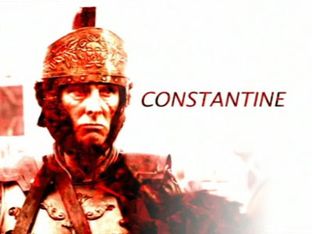Ancient Rome: The Rise and Fall of an Empire
Ancient Rome: The Rise and Fall of an Empire
Constantine (1x5)
: 19, 2006
Emperors Diocletian's 'Tetrarchy', a hierarchic system of four emperors, fails as they soon fight each-other. Autumn 321, co-emperor Constantines army prepares north of Rome to defeat his tyrannical western rival Maxentius. Clerk Lactantius, whose writings are the major source for this film, tries to convince Constantine to put his faith in the secretive slave religion, Christianity; something in the sky, perhaps a striking meteorite, is taken as a divine sign; he adopts the PX-emblem -crossing Greek letters chi and ro for Christ- to mark his troops' shields, even though the men are reluctant to betray the pagan gods. Maxentius, who just received major reinforcements, bringing his strength to 75,000, lays a trap at the Milvian bridge over the Tiber, but it fails and he drowns. Constantine promises his reign will liberate the people and restores goods and senatorial authority, making his entry a true triumph. Now he turns his attention to the easter half of the empire, and marries off his sister to emperor Licinus, consecrating the final division in two Roman empires, not four, by the treaty of Milan, with a proviso of religious tolerance. In 315 Constantine abandons pagan worship, starts building churches, converting to Christianity in all but name; the senatorial majority conspires against him with Licinus, but traitor Bassianus' attempt at Constantine's life fails. A long war for the soul of the empire follows, till in 324 the raised Christian standard seemingly topples the decisive battle. Licinus' surrender reunites the empire under Constantine. The church council of Nicaea agrees in 325 a creed of the Christian faith and Licinus is strangled. During twelve more years he establishes the new, Christianized empire.
